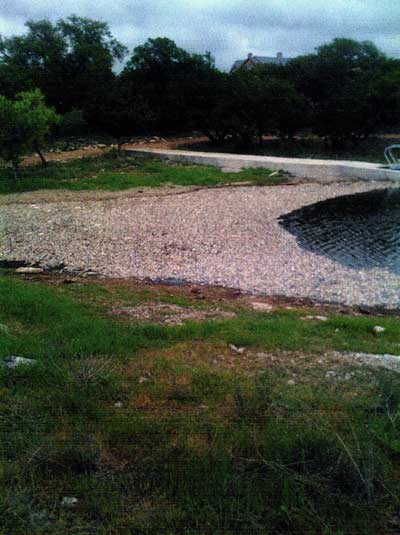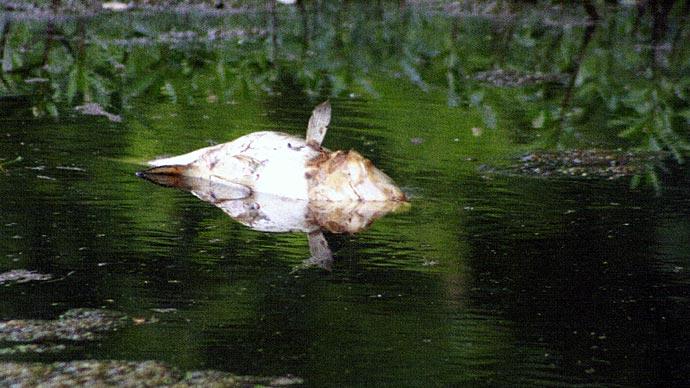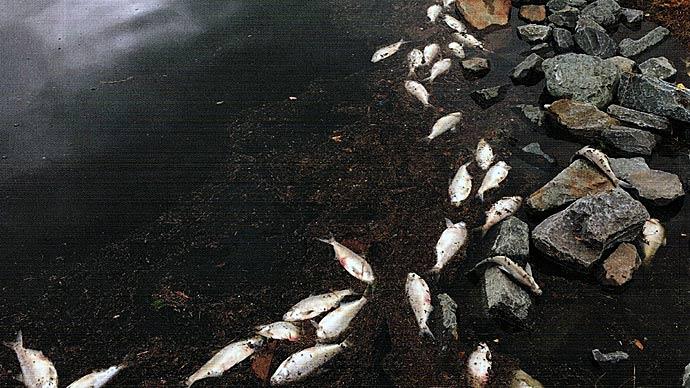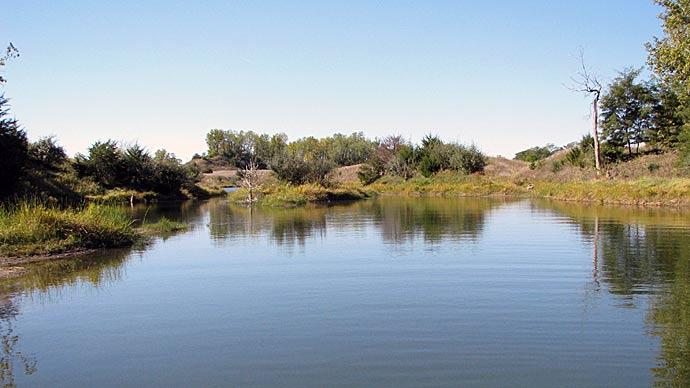
There's a standing joke at every meeting where aquaculturists come together. "You're not a fish farmer until you've killed fish." While it's not a laughing matter, all of us in this pond management business have tales of ways we've killed fish...or at least contributed. The different ways are what make guys like me roll their eyes. Some of them just defy logic.
I'll never, ever forget one way I lost some fish. In the early 1990s, I had a good fish sale pending. I collected more than 10,000 small bluegills to stock a nice lake. I had a holding tank of 800 gallons of water. Put those fish in that vat to let them flush their digestive systems, harden up, and heal from handling.
I double-checked the aerators. All good. Adjusted the small flow of well water—didn't want too much water flowing through.
Delivery was planned for the next day.
That afternoon, we headed to the school to watch one of the kids play ball. We were gone for about six hours in total.
When we got home, I went to check on the fish and make sure they were good. They weren't.
All were dead. I was shocked, not only at the once-beautiful, uniform 2-3" fish all floating belly up, but the water was blood red. I'd never seen that before. Then, my heart stopped when I saw a mat of black hair bobbing at one end of the turbid water amidst the thousands of dead fish. The thoughts that rushed through my mind were quelled when I lifted that mass of black hair.
It was a kitten. A little black and white kitten. We'd just gotten two of them, sisters, to be barn cats. I laid the dead kitten on the edge of the vat and kept studying the situation. Why was the water red? Then, I saw the second kitten floating in a mass of dead fish.
I buried two kittens and $3,500 of dead bluegills in the same mass garden grave. As I dug the hole, it hit me. We fed those cats food with red color. When they died, they voided. They tainted the water enough to cause those fish to die.
My lesson? I should've had a ladder in that vat, so the kittens could go fishing, fall in, and then escape. They couldn't get out. I promise that if you lose fish, it won't be caused by barn cats.
When our phones ring in the hot summer months, we are poised for what we're about to hear. Way too often, it's a heartbreaking call from a pondmeister who's had a fish kill.
They want to know, "Why?"
Most biologists will simply say, "You had an oxygen depletion."
While that may be true, oxygen depletion is one event in a chain of happenings to reach that point.
Several years ago, we received a call from a north Texas pondmeister who'd had a fish kill. He was convinced someone poisoned his fish. There was a neighbor whose teenage son drove down their country lane like a bat off the roost at dusk. Fast and swerving, acting dangerous and rutting the shallow ditch in their yard by the road. Our pondmeister had his fill of it and called the boy's parents. He wanted to blame the boy, figuring the teen was seeking revenge. As he processed what caused those fish to die, he remembered the landscape guy was there yesterday, mowing, weedeating, and treating fire ant mounds. Maybe he did it accidentally.
The guy was heartsick. I let him vent for a minute and then went through my methodical line of questions.
How big is your pond? He said it was about half-acre. How many fish died? This answer helped me as I navigated toward an answer. He said he lost more than two hundred big catfish. Next, I enquired as to the fish sizes and approximate age. The pond was in its fifth year, and those catfish ranged from three to eight pounds.
Math started to overtake my questions. Let's see, two hundred catfish at even three pounds is 600 pounds of fish. If they averaged five pounds, then he had a thousand pounds.
What did he do with them? He explained that he and a helper loaded them into the bucket of his Kubota tractor, hauled them to the back of his 40 acres, and piled them up for scavengers. How many buckets of fish? He said they completely filled the tractor bucket three times.
That's when I pretty well knew what happened to him.
The next line of questions led him to his answer. While one of his fingers pointed at a neighbor kid or contractor, the other three pointed right back at him.
How much fish food did you feed every day? What kind of fish food is it? How many fish did you originally stock? How many have you harvested?
It seems he fed the fish most every day. He bought the cheapest fish food he could at the local feed store. He originally stocked 300 fish with fathead minnows. No minnows died, only catfish. He had harvested 15-20 over the last couple of years. He said he fed 15-20 pounds of feed daily. He had no minnows because the catfish ate them.
I asked him if he fed two bags a week to confirm what I was hearing. Affirmative.
He killed his fish with kindness. Did it to himself.
My best estimate, which he agreed, was that his pond had at least 800 pounds of catfish in it. If his fish converted the grain-based fish food at a normal rate, that means they converted two to one. Two pounds of fish food became a pound of gain or maintenance, and the other pound became waste, solid or otherwise. Over time, the fish and fish waste biomass grew beyond what the pond could support, so there was a correction.
Not to dig into him any deeper, I asked my last question. I asked if anyone had told him to harvest fish along the way. His tone changed a little bit. He almost sounded a little sheepish about it. "Yes, several times. I just couldn't bring myself to eat fish I fed and saw daily.
While it may have been an oxygen depletion that killed his fish, the lack of oxygen wasn't the problem. The problem was too many fish in a space that couldn't support them. Crowded fish leads to other issues. In his case, normal day-to-day biological functions couldn't escape or break down. His fish were essentially swimming in their own septic tank. Toxic water contributed to the fish kill.
He also offered that his fish hadn't been feeding normally for more than a week and then completely stopped two days before they died.
That's a sure sign that something is about to happen.
Water quality was rapidly deteriorating. His water was toxic, burning fish gills and upsetting their whole-body function to death.
What could have prevented his issue? Keep fish biomass at or below 300-400 pounds per acre, not 1,600 pounds per acre as he likely had in his half-acre pond. Harvest fish as they grow. Besides, a two-pound catfish has better texture and flesh to eat than a five-pounder in a pond. Secondly, if he wanted to push the envelope a little bit, aerate the water and be able to exchange water from time to time. He has a water well and irrigates his yard. He could have irrigated out of the pond and used some of his nitrogen-rich water for the grass and fresh, well water for the pond. Aerate the pond. Aeration moves water to associate with the atmosphere, where gas exchange occurs. Get rid of some bad stuff and trade it for the good stuff.
Fish can die in many ways, but almost all of them in recreational ponds center around the water. If your water isn't happy, its inhabitants won't be. Be preventative rather than reactionary.
Here's another classic case of potential oxygen depletion. I'm working with some folks in Mississippi right now. They have an old lake that covers about 8 acres and a brand-new lake similar in size. The onsite manager is instructed to take photos of the water color, visibility depths, and temperature, top to bottom, in three-foot increments and send them to me at least once a week. The old lake has an old paddle-wheel aerator like local catfish farmers use, and the new lake has a bottom-diffused aeration system.
When the old lake visibility decreased to 12 inches, I had them set the timer for the paddle-wheel aerator to start at five in the morning and run until ten. With water the color of green olives, I know there's enough plankton biomass to consume oxygen faster than it can be replaced, especially after two or three consecutive hot, cloudy days. Mark that last sentence in your brain. Two or three consecutive hot, cloudy days. Also, remember that the greener the water is with plankton and microscopic algae, the greater the risk, especially with low visibility. Buy a Secchi disk and use it.
When the new lake reached a visibility of 30 inches, I had them turn on the bottom-diffused system per the manufacturer's recommendations. Start with an hour a day, and double it daily until it's on 24/7. When the temperature rises to 82 degrees, top to bottom, they will be instructed to change the aerator to run from 9:00 at night until 9:00 each morning. Hot water can also lead to problems.
Happy water.
Another common cause of oxygen depletion that kills fish is too much aquatic plant growth. If your pond has more than 30-40% coverage of dense aquatic plant growth, you are a candidate. See above about those cloudy days. Plants produce oxygen during daylight and consume it after dark. When clouds cover the sun, plants can't photosynthesize normally. If oxygen production drops, there's not a parallel curve of consumption. They'll still use as much tonight as they did last night. If the supply is low, pond oxygen levels can drop to lethal for fish.
Fish have to breathe, and if the oxygen drops too low, fish suffocate.
If you have too much greenery and want to eliminate some of it, be careful. Decaying plant life also consumes oxygen. Because you've eliminated plants, you've also eliminated a source for producing oxygen that now only consumes it.
That's a bit of a Catch-22 situation. Know what you are doing before choosing to eliminate plants, especially with herbicides.
Are all fish kills bad? All fish kills are a sign of a problem. Your job is to figure out what that problem is. Almost every fish kill is related to water quality issues. We do see partial fish kills from time to time as well. Those are common in heavily vegetated ponds where some fish migrate way up in the plants and get caught in a brief local oxygen depletion because the plants drive dissolved oxygen levels down at night.
One of the least-concerning causes is fish disease. People often think disease is a problem that causes summer fish kills. While that's possible, it's scarce. I've only seen a handful of those over four decades of watching fish, and one case was a pond that flushed a lot of water from a big spring, and the fish got crowded, like too many people in an elevator. When one fish caught a bacterial infection, it passed it to others and they died. That was a partial kill of one species of similar size.
Focus on your water quality this summer. Look for signs. Keep aquatic plants in check. Don't let the visibility decrease below 18 inches with a thick plankton bloom. Harvest fish, especially catfish, if you are feeding them. If you are feeding more than about 15 pounds of fish food per acre per day, cut back and eat some fish.
Your favorite biologist or fish farmer doesn't want to receive your phone call about your favorite fish dying. And you don't want to be the one making that call.
Reprinted with permission from Pond Boss Magazine



